WORLD ENOUGH AND TIME
…I would
Love you ten years before the flood;
And you should, if you please, refuse
Till the conversion of the Jews – Andrew Marvell
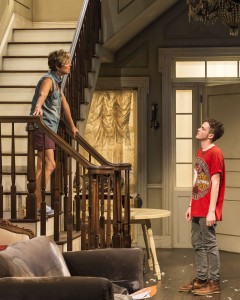 It’s a measure of progress that a play about white people can be written by a black guy and directed by an Asian guy on what looks like a half-million dollar budget for the Center Theatre Group. It’s too bad that in this case, it’s unrecognizable as any life ever seen on earth.
It’s a measure of progress that a play about white people can be written by a black guy and directed by an Asian guy on what looks like a half-million dollar budget for the Center Theatre Group. It’s too bad that in this case, it’s unrecognizable as any life ever seen on earth.
If a future civilization finds artifacts superficially indicative of a North American culture 65 million years into the Cenozoic period, and an alien playwright having never seen a human produces a three-hour bore by using as a model scraps of Tracy Letts and Ta-Nehisi Coates, the result might look a lot like Appropriate. But one need not wander the space-time continua to explain this play. Sure, every time someone talks it’s exposition, and people are stand-ins for paragraphs in a book-length essay, and nothing anyone does seems to be for a purpose outside the author’s agendas, but that doesn’t take aliens.
If you tasked a middle-class white African-American Studies major with writing an unflattering portrait of white privilege, she might set that story among the descendants of slaveholders, standing in their ancestral plantation home complete with a slave cemetery, concerned only about maintaining a bourgeois status quo. And that it has in fact been written by a middle-class black playwright is, again, some measure of how far we’ve come. A play about race for an American theater audience hardly needs to be written at all, since we, the educated liberal elite, already agree. Don’t we? And anybody who doesn’t, well, they’re on the wrong side of history. Right?
The unsubtle sermon called Appropriate is one of two 2014 shows from Branden Jacobs-Jenkins to win, jointly, an Obie award for best new play. This may explain something about New York no longer being the center of American theater. I have heard that An Octoroon, Jacobs-Jenkins’ politicized adaptation of Dion Boucicault’s similarly named 1859 melodrama, is very good. It must be. In order effectively to apologize for the one-note protraction on offer at the Taper, An Octoroon would have to be good enough to convert the Israelites.
Apologies are the central theme of Appropriate, and like everything in this play the apologies are both implicit and screamed. The play contradicts itself often enough to pretend that it merely raises questions, but it’s just a pose. Jacobs-Jenkins isn’t coy. He’s quietly brazen. White people should apologize for slavery; parents should apologize for their children; molesters should apologize for rape. Everyone should be sorry before, during, and after their own history. When they aren’t blindingly obvious, the play’s statements can be passive-aggressively, smugly, morally wrong – but they’re all loud. This is possibly the least subtext ever rendered for a judgmental three-act dirge.
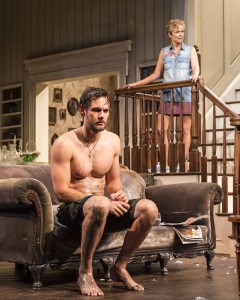 And as such, it’s a play shockingly unaware of itself. A character says that “all I’ve learned about this family is that everything’s a secret.” This was far from my experience of the Lafayettes. I kept wishing they’d keep something from me, but every thought hatched by this motormouth brood is shrieked in everyone’s face, all the time. And none of it is worth hearing.
And as such, it’s a play shockingly unaware of itself. A character says that “all I’ve learned about this family is that everything’s a secret.” This was far from my experience of the Lafayettes. I kept wishing they’d keep something from me, but every thought hatched by this motormouth brood is shrieked in everyone’s face, all the time. And none of it is worth hearing.
So stop me when you’ve heard this one: An extended family (including a weary married couple, a vulnerable teen girl, and a sibling’s new flame) gathers in the old Southern homestead to pick over the estate of a dead father and in the process yells at each other a lot, vents old frustrations, has unpleasant relations; there’s overt racism and a vicious, loquacious maternal figure; somebody drinks too much; there’s a secret about a baby that isn’t, really; there’s a brawl (among the least convincing I’ve witnessed outside professional wrestling).
The only two elements not in Letts’s 2007 August: Osage County are that a) every character and audience member has heard all this before, and b) it’s not entertaining. It’s been said that this play is a send-up of the family dysfunction drama, but that’s as wrong as the play itself. In order to parody anything it would have to possess a sense of humor. Send-ups don’t have multiple climactic speeches that earnestly ask, “What is a family, anyway?” and then go on straightfacedly to theorize that really, when you get down to it, we’re all just people.
The dialogue is dull when it should be funny or poignant, the themes portentous and clunky when they should be wise. The play is not edifying or clever or even interesting. By virtue of length alone can this be compared to the family epics of Eugene O’Neill; it is a play not in the tradition of grand American monsters but of annoying, whiny cunts. And by the time characters get around to actually calling each other cunts, I’m 180 minutes ahead of them.
There are good actors in this play – Zarah Mahler and David Bishins in particular hold up under Eric Ting’s Stand and Deliver direction – but it doesn’t matter. By virtue of having the most lines and reciting them all in the same irritating but barely audible register, Melora Hardin is the prime offender, but it’s not her fault her character manages to remain underwritten while spouting 19 different monologues. And there’s so much else wrong here.
 Ting directs as if unaware of the basic nature of dramatic storytelling, which is that it should contain drama. Granted, the script provides almost none at all beyond MacGuffins that don’t matter and dropped hints – someone’s gay! someone’s losing his job! someone’s got a crush! someone’s pregnant! – that are never picked up.
Ting directs as if unaware of the basic nature of dramatic storytelling, which is that it should contain drama. Granted, the script provides almost none at all beyond MacGuffins that don’t matter and dropped hints – someone’s gay! someone’s losing his job! someone’s got a crush! someone’s pregnant! – that are never picked up.
But a director can shore up the weaknesses in writing; he can at least indicate where drama would go if there were any. On this stage the actors take root like shrubberies, the words tumble pell-mell, the gestures (like gratuitous interstitial cicadas and the grotesque deconstruction of the set as a denouement) all blend into a wash. The many points in the many monologues just cancel each other as so many self-confident syllables. It is so long. So, so long.
Mimi Lien’s set demands mention, as an element that deserves better than it got: A rock-solid antebellum interior that helps tell the play’s inchoate story better than anything in the writing or direction; an element that the writer and director destroy, to make a point about America’s history destroying its present…a point that was not new when Sam Shepard started making it fifty years ago. Or O’Neill fifty years before that. Or Boucicault fifty years before that. Which makes this play not merely tedious but unnecessarily so.
In one of four or five false endings, Jacobs-Jenkins has a real estate agent enter the wrecked house to take pictures – OF THE AUDIENCE, GET IT? THE FOURTH WALL IS AMERICA. Eric Ting’s handling of this scene includes having the agent wade through foul ankle-deep water instead of walking around it. A man who works for a living doesn’t give a damn about ruining a pair of hundred-dollar shoes? In what reality? This is the kind of direction this writing deserves. Don’t reward it with an audience. Wait for An Octoroon, and hope to God New York was right about that one.
Appropriate
Center Theatre Group
Mark Taper Forum
Music Center, 135 N. Grand Ave
ends on November 1, 2015
for tickets, call 213.628.2772
or visit CenterTheatreGroup.org
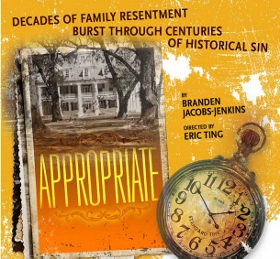
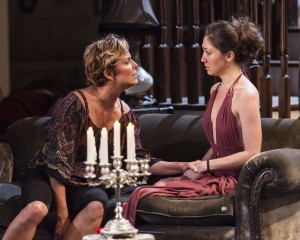
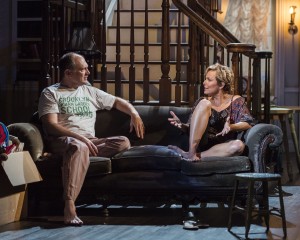
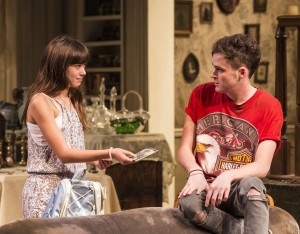
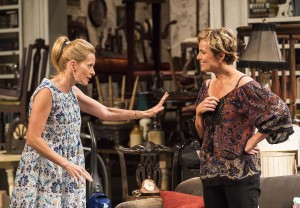
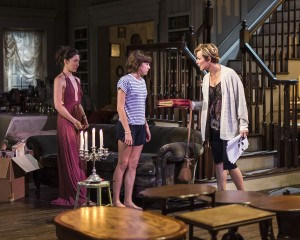
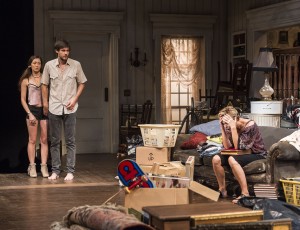





{ 2 comments… read them below or add one }
This is one of the greatest wasted opportunities I have seen on stage in some time. I thought that the context here was going to be about ghosts and the sins of the fathers and wounds that never heal. I was willing to accept the premise of this dysfunctional dysfunctional family drama (three children coming home to handle the newly deceased father’s estate), because of the introduction of a photo album containing daguerreotypes of lynched African-Americans, and the discovery of jars containing body parts of murdered blacks (creepy in the vein of Thomas Tryon’s The Other). I was hoping for an unsettling ghost-story drama in which the siblings–I don’t know–become possessed by the dark past (in the play, one was interested in turning the plantation into a B & B; why couldn’t the others want to turn it into a lynching museum, or some such roadside attraction monopolizing on their father’s racism?).
And boy, did that second act really lose me. Not just because of all that self-knowing dialogue, but the director’s cinematic approach.
Jacobs-Jenkins is no fluke; his Neighbors, messy but brilliant, is etched in my memory as one of the greatest plays about race in America I have ever seen.
Check out Stage and Cinema‘s review of the original production of Appropriate at Victory Gardens in Chicago.
I really found this play interesting and stimulating. Using the common family dysfunctional drama to explore issues of race and the legacy of slavery I found resonant. To say it’s about apologizing is wrong, it’s about recognizing and conveniently forgetting our past.
I did see the An Octoroon and it is indeed a brilliant and superior to Appropriate.